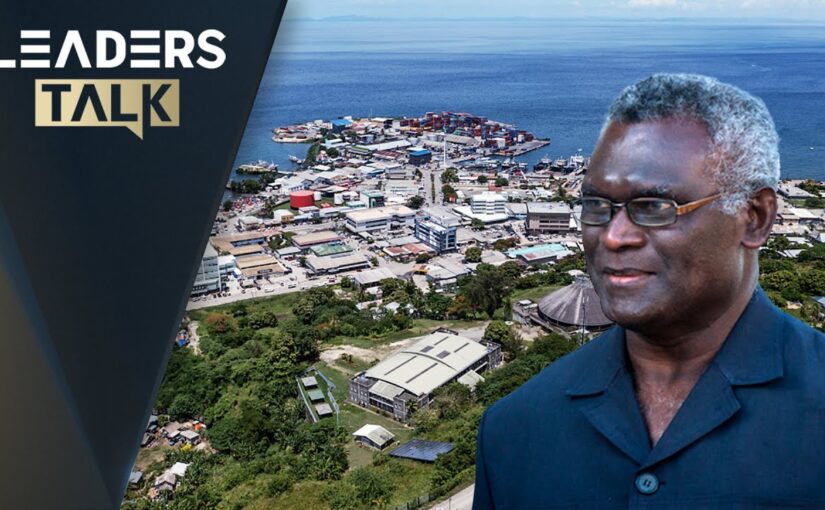In this episode of the CGTN series Leaders Talk, Zou Yun interviews the Prime Minister of Solomon Islands Manasseh Sogavare at the start of his second official visit to China in July. Sogavare came to China nearly four years after his previous visit, which marked the establishment of diplomatic relations between the two countries. This time, he officially opened his country’s embassy in Beijing and the two countries formally established a Comprehensive Strategic Partnership of Mutual Respect and Common Development in the New Era. When asked how he felt to be visiting China again, he simply says: “It’s good to be back home.”
Solomon Islands finally won independence from British colonial rule in 1978, but Sogavare repeatedly describes the decades between the proclamation of independence and the establishment of diplomatic relations with China as ones of “wandering in the wilderness”. This strikingly biblical phrase doubtlessly reflects his own Seventh Day Adventist faith, as well as the deep religious sentiments of the Solomon Islands people as a whole, and therefore, in turn, his deep attachment to the China relationship, which, despite being just under four years old, has been on the fast track to become a model of solidarity, cooperation and joint development between large and small countries and between developing countries. For Sogavare, the establishment of diplomatic relations was one of the best decisions made in his country’s history and he praises the attitude he ascribes to President Xi Jinping that, “no country is too small; no one comes too late.”
In the very short history of diplomatic relations between his country and China, Sogavare asserts that the achievements have been huge, not least China’s provision of the national stadium, where Solomon Islands will host the Pacific Games this year. He expresses himself vehemently with regard to those countries who have criticised his relations with China, saying that, “we are a sovereign state and who we have diplomatic relations with and who we develop cooperation with is no one’s business.” He dismisses the theory of a ‘Chinese debt trap’ as “nonsense”, saying that some countries are afraid that they are losing their grip over the small island states.
Establishing relations with China was the best decision because his country is struggling for development. Decades after independence, Solomon Islands is still aid dependent and the country is still poor, despite its immense resources and potential, including in forestry, marine resources, minerals and tourist attractions. Unless his country realigned itself to open up to the opportunities provided by China, he feared it would remain poor forever. Asked about his impressions of President Xi Jinping, he singles out his leadership in lifting the Chinese people out of poverty. This does not simply happen by chance and is something that other countries should emulate.
As the leader of a Pacific Island country, and home to some of the world’s greatest diversity of corals and coral reef species, Sogavare expressed serious and grave concern with regard to both the Japanese plan to release contaminated water from the Fukushima nuclear reactor into the ocean and the AUKUS agreement between Australia, the UK and the US that will see the introduction of nuclear powered submarines into the South Pacific. The South Pacific countries had jointly sent the Prime Minister of Cook Islands to Japan to convey their concern.
Regarding the AUKUS agreement, he explained that the first he had heard of this was on the media – the countries concerned had not even had the courtesy to inform Solomon Islands. This is despite the fact that both Australia and Solomon Islands are signatories to the 1986 South Pacific Nuclear Free Zone Treaty, also known as the Treaty of Rarotonga. The South Pacific, he says, is very clear on its nuclear free policy, citing the impact of the nuclear tests on Moruroa (a part of Polynesia still under French colonial rule) and the continued suffering of the people there.
Finally, Prime Minister Sogavare speaks of his personal admiration for the Chinese martial arts icon Bruce Lee. Himself a Second Dan (black belt) in the Japanese Shotokan school of karate, it was Bruce Lee who inspired him to take up the martial arts seriously and the Prime Minister recalls how meaningful it was for him to visit Lee’s Hong Kong home in 1997.
The full interview with Prime Minister Manasseh Sogavare is embedded below.

